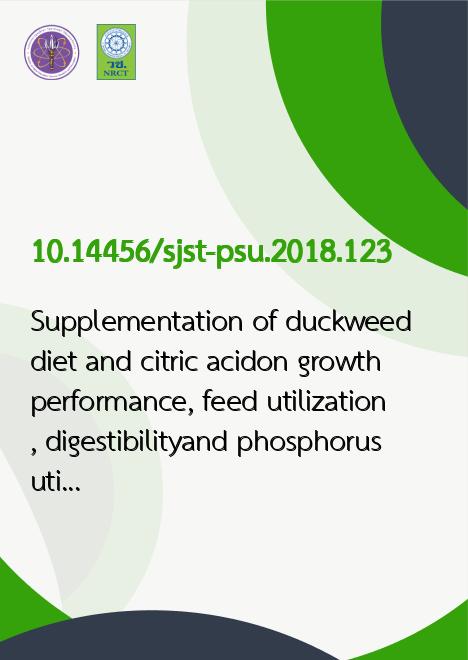
|
Supplementation of duckweed diet and citric acidon growth performance, feed utilization, digestibilityand phosphorus utilization of TGGG hybrid grouper(Epinephelus fuscoguttatus x Epinephelus lanceolatus) juvenile |
|---|---|
| รหัสดีโอไอ | |
| Creator | 1. Christine Anthonius 2. Annita Seok Kian Yong 3. Ching Fui Fui |
| Title | Supplementation of duckweed diet and citric acidon growth performance, feed utilization, digestibilityand phosphorus utilization of TGGG hybrid grouper(Epinephelus fuscoguttatus x Epinephelus lanceolatus) juvenile |
| Publisher | Research and Development Office, Prince of Songkla University |
| Publication Year | 2561 |
| Journal Title | Songklanakarin Journal of Science and Technology |
| Journal Vol. | 40 |
| Journal No. | 5 |
| Page no. | 1009-1016 |
| Keyword | hybrid grouper, citric acid, duckweed, growth, feed utilization |
| URL Website | http://rdo.psu.ac.th/sjstweb/index.php |
| ISSN | 0125-3395 |
| Abstract | A feeding trial was conducted in juvenile TGGG hybrid grouper to investigate the growth performance, feedutilization, and digestibility after citric acid supplementation in a diet that was partially composed of duckweed. Five isoproteicand isolipidic diets (50% protein, 16% lipid levels) were formulated using Lemna minor and Spirodela polyrrhiza at 5% offishmeal protein replacement level with or without 3% of citric acid supplementation. A diet without duckweed and citric acidwas used as the control diet. Triplicate groups of fish (10.30?0.05 g) were randomly distributed in tanks with a flow throughsystem at a stocking density of 20 fish per tank. The fish were fed twice daily with each experimental diet until apparent satiationfor 10 weeks. As a result, the fish fed a diet with duckweed S. polyrrhiza and citric acid (DSC) achieved significantly highergrowth, body weight gain (BWG) and specific growth rate (SGR) compared to the control group (P<0.05); however, it was notsignificantly different with other treatments (P>0.05). The growth, BWG and SGR in fish fed duckweed diets only (L. minor andS. polyrrhiza) were almost similar with the control without significant differences (P>0.05). Similarly in feed utilization, fish fedthe DSC diet had a better feed conversion ratio, protein efficiency ratio, and net protein utilization without significant differences(P>0.05) compared to the control. The apparent digestibility coefficient for crude protein and crude lipid, and phosphorusabsorption of DSC and the diet with duckweed L. minor and citric acid were comparable to the control without any significantdifferences (P>0.05). Survival was not affected by the experimental diets. This study showed that TGGG can utilize a dietpartially composed of duckweed and better performance was observed with the aid of citric acid. |
